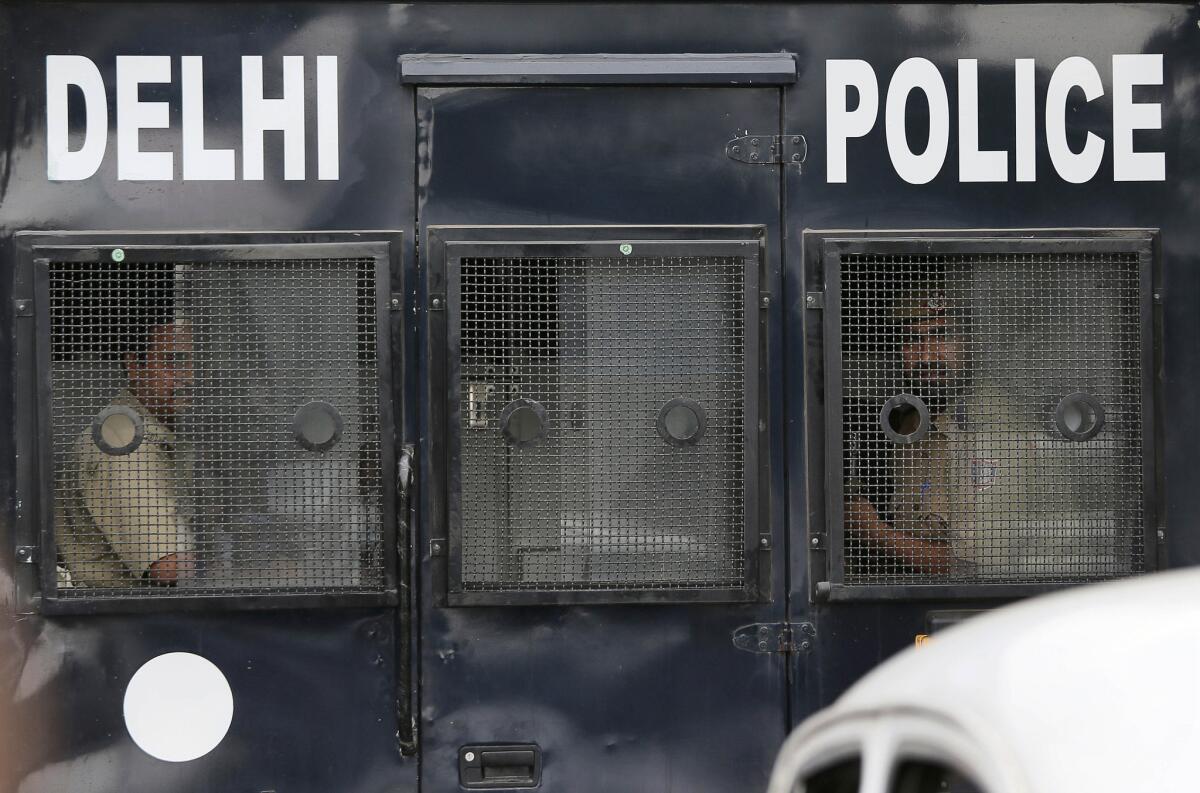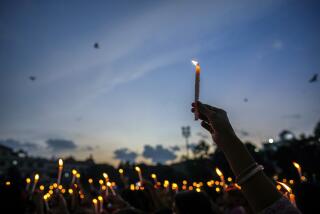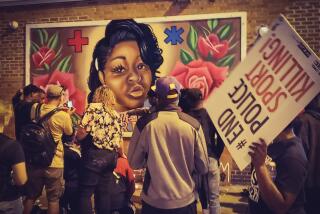Indian police praised for handling of bus rape; other cases languish

NEW DELHI – In advance of Friday’s sentencing of four men convicted in India’s notorious Delhi gang rape and murder case, great praise has been lavished on the country’s police by newspapers, TV channels, courts and the public for their professionalism, quick investigation and use of forensic evidence.
But the impressive results have also prompted critics to ask: With about 90,000 rape cases languishing, why is this the exception rather than the rule?
“There’s very little possibility these tools will be applied in other cases,” said Ajai Sahni, executive director of New Delhi’s Institute for Conflict Management, a think tank.
“Unfortunately, only in extraordinary cases in India can the victim hope for any sort of justice,” Sahni said.
Within days of the victim’s brutal rape and assault with iron bars while traveling on a moving bus in mid-December, six suspects were identified and apprehended. In addition to the four convicts who face a life sentence or execution, a fifth suspect reportedly killed himself in prison, although his parents claim it was murder. The sixth, a juvenile at the time, was given the maximum three years in a youth rehabilitation center.
Investigators secured a statement from the victim, a 23-year old physiotherapy student, in the hospital before she died. That proved crucial in the convictions, along with leads provided by her male friend, who was also beaten up on the bus.
And though the suspects washed the bus and burned clothing to hide their tracks, police recovered blood-stained items, which they used to help build a quick case. Dental records were matched to bites on the victim’s body, while phone records helped tie suspects to the scene.
The convictions took less than nine months, lightning fast by Indian standards.
While detailed investigations and forensics are standard in many countries, they’re rare in India, where police are often said to be corrupt, poorly trained and beholden to politicians.
“It was probably the first time that a sample of dental impression was used as evidence in a rape case,” said an article Wednesday in the Hindustan Times.
The case has sparked a tougher rape law, fast-track courts and national soul-searching. Without sustained public outrage at the government, police and the courts, however, the system probably would have defaulted to its creaky self, analysts said.
“This is the first time we were aligned -- people, prosecutors, the courts -- with the criminal justice system,” said Kiran Bedi, the first female Indian Police Service officer and a former inspector general of prisons in Delhi. “Why this doesn’t work in normal times is a tragedy.”
The case hit a nerve in part because many Indians saw themselves, wives or daughters in the victim. Born into a poor family in the northern Uttar Pradesh state, she attended college, studied hard and moved to New Delhi to pursue her dream. She has not been identified under Indian law.
Analysts said police in India often lack the staff, training, budgets or equipment to act professionally. The country has 129 police officers per 100,000 civilians, the second-lowest figure of 50 countries surveyed by the United Nations, just above Uganda. The United States has 238 and South Africa 327.
India, which has 29 forensic labs for a population of 1.2 billion, often cites inadequate resources. It spends on average a little over 1 rupee – about two cents – per person per day on policing. But this budget, less per person than a cup of sweet masala tea, is a matter of priorities, Sahni said.
“There’s no shortage of money; we have billions of dollars being poured down the drain in scandals,” he said. “And it’s not inertia. It’s willful. There are 162 members of parliament and over 3,000 state legislators with criminal charges against them. The last thing they want is stronger policing.”
Poorly built cases and long delays take their toll, analysts said, with just 15% of rape cases ending in conviction in New Delhi, dubbed India’s “rape capital,” compared with 24% nationally in 2012 and 26% in 2011.
“If you have bad policing, you will always get low conviction rates,” said Maja Daruwala, director of the New Delhi-based Commonwealth Human Rights Initiative, a civic group. “Police reform has been abysmal.”
Traditionally, India’s police and public have taken the view that “rough justice” -- including planted evidence, beatings and forced confessions to satisfy public opinion -- brings greater order to society, when in fact it’s the opposite, Daruwala said.
Rajan Bhagat, a Delhi police spokesman, said he objects to the generalization that the city’s police maintain high standards only in high-profile cases. In fact, they solve over 90% of rape cases within a week, he said, even if prosecution lags.
“There are standard operating procedures that are followed strictly,” he said. “The police are trained to be compassionate and considerate.”
Women’s groups hope that more female police officers and sensitivity training in Delhi will make victims less reluctant to report sexual crimes. But there’s still enormous stigma against women who speak out, especially in the countryside.
Gudiya, 25, from the northern Rajasthan state, said she sees little indication that much has changed for women in India. In 2008, four men put sedatives in her drink and gang raped her, she said, then blackmailed her into having sex with them for years using the threat that they would upload videos of the rape to the Internet.
She told her parents in 2012, after they found her unconscious after a suicide attempt.
Police initially balked at filing a case against her well-connected attackers, then forced her to reduce the charges, she said. The case is pending, with two suspects in jail and two out on bail.
She said the judge has favored the accused, repeatedly urging her to settle the case, and she’s seen a policeman chatting on Facebook with one of the suspects.
“I have little hope and feel suicidal,” said Gudiya, who gave only her nickname. “The police only acted because all the media was watching in Delhi.”
ALSO:
Apple fans in China find new iPhones costly
Kerry arrives in Geneva for talks with Russia on Syria
Prince William to leave the military, become full-time royal
Twitter: @markmagnier
Tanvi Sharma in the New Delhi bureau contributed to this report.
More to Read
Sign up for Essential California
The most important California stories and recommendations in your inbox every morning.
You may occasionally receive promotional content from the Los Angeles Times.










